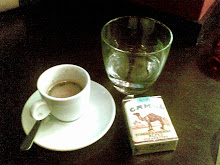"Given the philosophy that has always inspired us at Argiano, we are unable to stand back and wait for the events to take their course. Our foremost wish is to enable our faithful customers to enjoy our excellent wine this year as well. For this reason we will make a great sacrifice, one that is truly enormous for a winemaking company: we will declassify our top wine, our flagship."
"In this unforgettable and unique year there will be a new label: IL DUEMILATRE DI ARGIANO. We have decided to change the name, contained in the classic label that has become our symbol, but leaving the wine unchanged in its essence, the same as ever, the same wine that on more than one occasion has permitted us to win praise and awards. We steadfastly keep to our values and our enthusiasm, which are firmly rooted in our history, dating back to 1580."
yeah ... my heart bleeds for them. let the cheap wine flow.
update:
The Brunello Controversy: a winemaker’s perspective
by Tom Hyland
Earlier this week, I had lunch with Hans Vinding Diers, winemaker at Argiano in Sant’Angelo in Colle, one of the four initial estates named in the scandal that has now accused several dozen wineries of altering their 2003 Brunello with the possible addition of Merlot or Cabernet Sauvignon to this famous Sangiovese-only red. Diers was very forthright with answers to my questions about this situation and I thank him for his insight.
Diers at first wondered why Argiano was being investigated with the three other wineries, Antinori, Banfi and Frescobaldi, all of which are quite large in size (Argiano only bottles 55,000 bottles of Brunello in an average year as compared to several hundred thousand bottles from the other estates). His first encounter with the Guardia di Finanza, which is investigating this, happened when they flew helicopters over the Argiano estate this past December, presumably to see for themselves if there were Merlot or Cabernet vines intermingled with the Sangiovese.
I asked Diers how anyone could see this in December when the vines were dormant. “I thought the only way you could tell was by looking at the leaves,” I said. “Exactly,” Diers replied.
Nonetheless, later that month, the authorities impounded the remaining bottles of 2003 Brunello di Montalcino not yet shipped by the winery. As this situation has yet to be settled throughout the district, the authorities have impounded wine at dozens of other estates, all of which are under varying degrees of investigation. Diers argued that they needed to sell this wine, so a compromise was reached. Argiano is now able to ship this wine to market under a new name, Il Duemilatre di Argiano (literally, the Argiano 2003). This is the same wine as the 2003 Brunello with the same black label the winery uses to denote their signature wine.
Interestingly, Vias, the American importer for Argiano is now selling the wine under the two labels, as they received an allocation of the Brunello before it was impounded in December. They are selling the Il Duemilatre bottling to their customers at 20% less than the Brunello bottling, which should sell out very soon. I tasted the two bottlings with Diers and they are indeed the same wine. Having tasted over a thousand examples of Brunello di Montalcino over the past seven years, I can offer the opinion that this is indeed 100% Sangiovese. The color incidentally is a bright garnet, though without the intensity one finds in the finest years. Diers explains, “In a hot year, you get a lighter color such as this, one that bleaches out sooner than in a cool year.”
Diers believes this investigation is at a standstill. “They don’t know what to do now,” he commented, referring to the prosecutors handling this case. One thing that has been settled is the question about the vineyards at Argiano. “Our vineyards have been found to contain no irregularities, as far as other varieties are concerned.”
Diers has seen this all before and questions the power the authorities have in this matter. “It’s a grand Italian opera. The magistrate in this case has autonomous power and the big boys (referring to the large producers) can’t do a thing.” His closing statement, as it were, was a refrain I’ve heard often from the country’s businessmen: “In Italy, you are guilty until proven innocent.”



No comments:
Post a Comment